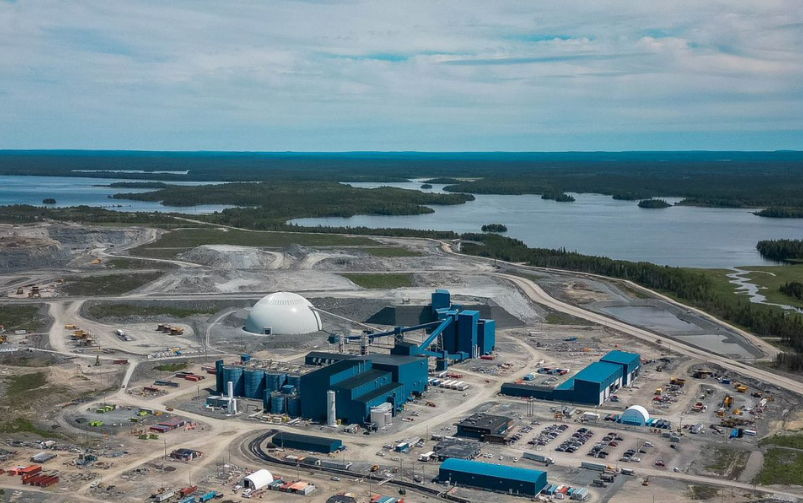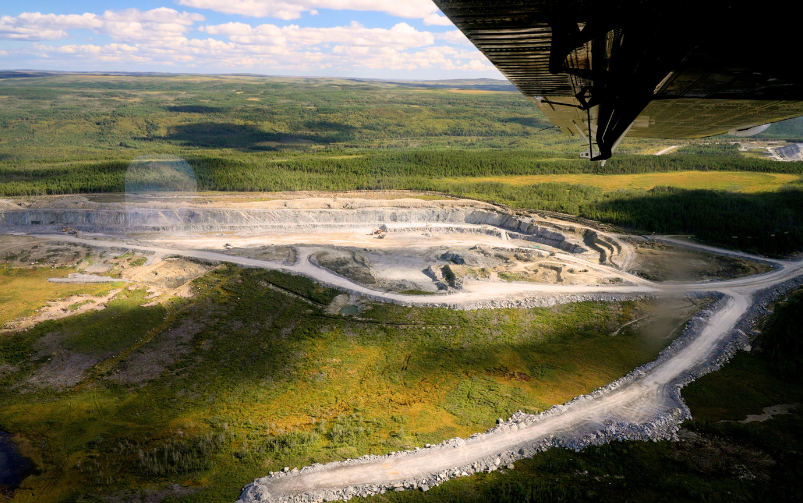Ascot Resources hired contractor Procon Mining and Tunnelling Ltd. to help bring its Premier gold mine and mill back into operation, after it was placed into care and maintenance in September. Courtesy of Ascot Resources.
Welcome back to your weekly mining news recap, where we catch you up on some of the news you may have missed. This week’s headlines include Orla Mining’s acquisition of Musselwhite, Sayona Mining merging with Piedmont and B.C. creating a new mining ministry.
Asahi Kasei Battery Separator Corporation recently broke ground on a $1.7 billion lithium-ion battery separator plant in Port Colborne, Ontario, which will become Canada’s first large-scale wet-process separator plant once it is built. The project is a joint venture between Asahi Kasei and Honda Canada. The plant is expected to begin commercial production in 2027 and will produce roughly 700 million square metres of coated separators annually, which is enough to supply around one million electric vehicles per year.
Ascot Resources has obtained $52.5 million in funding to restart its Premier gold mine and mill in northeastern B.C., as reported by Business in Vancouver. In September, the company suspended operations at its new mine, just months after first gold was poured, due to delays in developing its Premier Northern Lights and Big Missouri deposits and the need for additional funding to progress the mine’s development. Ascot aims to restart mill operations by the second quarter of 2025.
Troilus Gold has secured several letters of intent for project financing from export credit agencies in Canada, Finland, Sweden and Germany for a combined total of US$1.3 billion. This funding will support the Troilus copper and gold project, which is located northeast of Quebec’s Val-d’Or district, and includes a former producing mine on site. A May 2024 feasibility study projected that over its estimated 22-year mine life, the project could yield an average production of 303,000 ounces of gold equivalent annually, with peak production reaching 536,400 ounces of gold equivalent.
Vancouver-headquartered Orla Mining, which operates the Camino Rojo mine in Mexico, is acquiring Newmont’s Musselwhite gold mine in Ontario for US$850 million, as reported by Mining.com. The deal, which will more than double Orla’s annual gold production to 300,000 ounces, is set to close in the first quarter of 2025.
Australian miner Sayona Mining is acquiring Piedmont Lithium in an all-stock deal with the aim of consolidating its Canadian operations, as reported by Reuters. The merger involves Sayona becoming the parent entity and will result in a combined market capitalization of US$623 million for the new combined business. Sayona and Piedmont already have a joint venture in the North American Lithium complex in Quebec, which announced a new production record last week, while Piedmont has cut a significant amount of its staff this year due to lower lithium prices.
In order to streamline the approval of critical minerals projects and address regulatory challenges, B.C. Premier David Eby has split the province’s Ministry of Energy, Mines and Low Carbon Innovation into two: Mining and Critical Minerals and Energy and Climate Solutions, as reported by The Northern Miner. Jagrup Brar has been chosen as the minister of Mining and Critical Minerals and will manage 17 projects progressing towards construction, along with reforms to the Mineral Tenure Act. The B.C. government announced a critical minerals office and concierge service earlier this year in an attempt to speed up projects, but advocates say it is not enough. The Association of Mineral Exploration said B.C.’s long permitting wait times are impacting critical minerals projects with a combined value of $38 billion.
Cyclone Metals and Vale have signed a memorandum of understanding to advance the Iron Bear iron ore project near Schefferville, Quebec. The partnership will consist of a two-phase investment, giving Vale the option to earn a controlling interest in the iron ore project. The first phase, which would require a US$18 million initial investment, would fund a preliminary feasibility study, mineral resource drilling and environmental baseline studies.
A new progress report from Rio Tinto revealed ongoing struggles to improve working conditions at the company, as reported by Bloomberg. A survey found that 39 per cent of employees reported experiencing bullying in the past year, up from 31 per cent in 2021. This follows a comprehensive workplace review published in 2022 by Rio Tinto that offered an expansive and revealing look at mining’s workplace culture, which is plagued by discrimination and harassment. The review resulted in 26 recommendations for the company to follow to ensure a more respectful workplace, 17 of which the company has implemented to date.
Despite recent opposition from the Xatśūll First Nation, Osisko Development has earned approval for the B.C. Mines Act permits for its wholly owned Cariboo gold project in B.C., allowing the company to begin underground mine construction. The project is expected to produce up to 223,000 ounces of gold per year during peak production. With crucial permits in hand, the company is now progressing with pre-construction activities and anticipates commencing full-scale construction by mid-2025 with completion by the end of 2027.
That’s all for this week. If you’ve got feedback, you can always reach us at editor@cim.org. If you’ve got something to add, why not join the conversation on our Facebook, Twitter, LinkedIn or Instagram pages?




